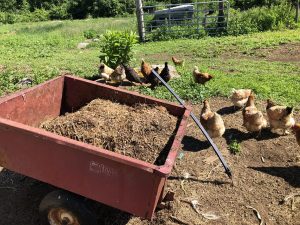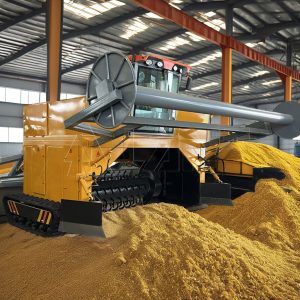Composting chicken manure is an excellent way to transform it into nutrient-rich fertilizer for your garden. Not only does it help manage waste, it also allows you to harness the benefits of organic matter. In this article, we’ll walk you through the process of composting chicken manure quickly and efficiently. Plus, we’ll introduce you to our state-of-the-art composter, which can take your composting efforts to the next level.

Benefits of Chicken Manure Composting
Nutrient-rich compost: Chicken manure adds valuable nutrients to the soil, promoting healthy plant growth.
Improved soil structure and drainage: Chicken manure compost enhances soil quality, allowing better water flow and root development.
Increased microbial activity: Chicken manure contains beneficial microorganisms that aid in decomposing organic matter and improving soil health.
Sustainable waste management: Compost chicken manure provides an eco-friendly solution for handling animal waste.
Reduced environmental impacts: Properly composted chicken manure reduces the risk of nutrient pollution in water bodies.
Cost-effective alternative: Using chicken manure compost can save money on synthetic fertilizers.
Pathogen reduction: Composting kills harmful pathogens present in chicken manure, reducing the risk of disease transmission.
Four Steps to Quickly Compost Chicken Manure
Step 1: Add Carbon Source
The nitrogen content of chicken manure is relatively high, but the carbon content is very low. The low carbon-nitrogen ratio is not conducive to the fermentation and decomposition of microorganisms, and is not conducive to the growth of plants, which will cause plant soil. At this time, we need to add 10%~ 20% of the inverted plate is either sawdust or crushed crop stalks to increase the carbon source and increase the carbon-nitrogen ratio. An increase in the carbon-to-nitrogen ratio will accelerate decomposition and be beneficial to plant growth.
Step Two: Adjust the Moisture Content
The chicken manure with carbon source should be tested for its water content. The suitable water content is 40% to 70%, and 50% to 60% is the best. When the water content is less than 40% or greater than 70%, it will Inhibiting the reproduction of microbial fermentation bacteria affects fermentation decomposition. If there is a soil moisture detection agent, you can use the soil moisture detection agent to detect the water content in the chicken manure. If you don’t have it, it doesn’t matter. You can hold it in a ball, and the chicken manure will disperse when you don’t let it drip. The amount of water is fine.
Step Three: Add Fermentation Agent
Add 200 grams to 300 grams of fermented bacteria per ton of chicken manure, sprinkle it on the chicken manure, and stir it evenly. It should be noted that the fermented bacteria do not need to be sealed as aerobic bacteria, but they need to be protected from rain.
Step 4: Flip
After one week of fermentation, when the temperature of the chicken manure reaches above 50 degrees Celsius, it needs to be turned over, which is conducive to uniform and complete fermentation. Generally, in about 20 days, the temperature of the chicken manure will drop below 45 degrees Celsius, and the texture is relatively loose. Stink, and some white mycelium is produced, it is time for the fermentation of chicken manure to be completed, and farmers friends can use it directly.
For users who need large-scale composting to compost chicken manure, they can use a special composter to process chicken manure. These composters can speed up the composting process and increase the efficiency of decomposition, so that chicken manure can be quickly converted into high-quality organic fertilizer. With the composter, users can conveniently control key factors such as temperature, humidity and ventilation to obtain faster and more efficient composting results.

Chicken Fertilizer Production Line
certainly! If you have more needs and want to further process the composted chicken manure into granular fertilizer, we also provide professional chicken manure fertilizer production line. This production line can convert the decomposed chicken manure into granular fertilizer through a series of process steps, such as crushing, mixing, granulating and drying. By using a chicken manure fertilizer production line, you can efficiently process composted chicken manure into granular fertilizers that are easy to store, transport and apply, improving its commercial value and utilization efficiency. Please tell us your specific needs, we will provide you with suitable solutions.
If you have more questions about how to compost chicken manure,please contact us.
Henan Lane Heavy Industry Machinery Technology Co., Ltd.
https://organicfertilizerline.com/
Email: sales2@lanesvc.com
Tel: +86 15515885328
WhatsApp: +86 15515885328